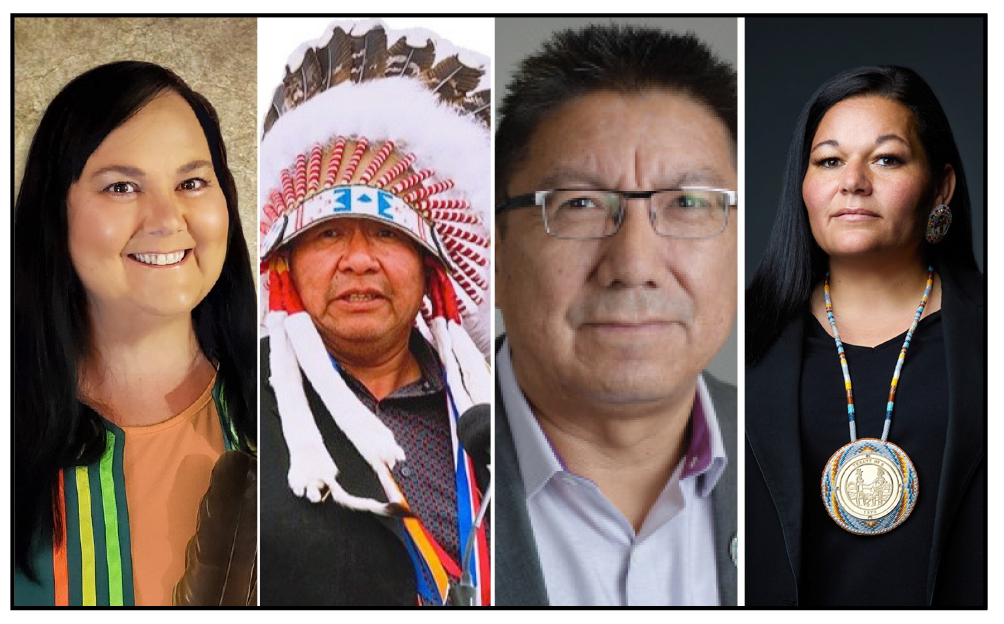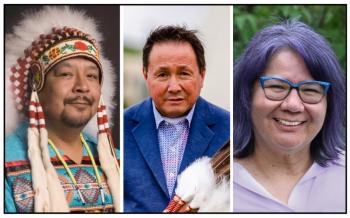Image Caption
Summary
Local Journalism Initiative Reporter
Windspeaker.com

The new national chief for the Assembly of First Nations will be taking office on what is anticipated as the cusp of a fall federal election.
All seven candidates for national chief agree that First Nation issues must be part of each federal party’s platform.
“First Nations have to be seen in their sovereignty rather than as a stakeholder out there in Canada. We are the rights holders in Canada. We’re the original nations in Canada and that has to be the foundation for any federal party,” said RoseAnne Archibald, former Ontario regional chief.
“They have to respect First Nations jurisdiction. They have to respect the rights…. We have to hear that in their platforms. We’ve got to hear the leaders speak about it,” said Reginald Bellerose, former chief of Muskowekwan First Nation, Sask.
Kevin Hart, former Manitoba regional chief, goes a step further.
“Advancement of treaty and inherent rights of First Nations needs to be first and foremost in the eyes of any party that are seeking to become the government of the day,” he said.
Lee Crowchild, former chief of the Tsuut’ina Nation, Alta., says the Canadian Constitution and Charter of Rights and Freedoms need to be revisited and changes are necessary for First Nations to get out from under the Indian Act.
“It will take us about 10 years to get there, but as long as we say that in 10 years we're all going to talk about the Charter and the changes we need to make … that gives us 10 years to train our own people,” said Crowchild.
For Dr. Cathy Martin, elected member for the Listuguj Mi’gmaq Government, it’s more fundamental than that.
“First and foremost, I think our First Nations need to be met at a very basic humanitarian level. We should look at those parties that are going to respect us as basic human beings before we look at other things,” she said.
According to figures presented by the AFN, while Canada has ranked between sixth and eighth on the United Nations Human Development Index, First Nations fall between 63rd and 78th.
Martin points to lack of clean drinking water, overcrowded housing, and not feeling safe when seeking healthcare or judicial services as basic concerns.
“We need to be seen as human beings first and foremost before we can even delve into the other aspects of closing the gap,” she said.
In 2015, with National Chief Perry Bellegarde at the helm, the AFN produced a document entitled Closing the Gap, referring to differences in the socio-economic status that Indigenous people experienced compared to Canadians. The document put forward specific issues on broad topics that the AFN wanted to see every federal party address.
In the 2019 federal election, Bellegarde and the AFN issued another document, this one entitled Honouring Promises. It followed up on the issues raised in Closing the Gap and incumbent Liberal Prime Minister Justin Trudeau’s promise that Canada’s most important relationship was that with Indigenous people.
Nishnawbe Aski Nation Grand Chief Alvin Fiddler said he’s tired of promises that are not delivered on.
“The days are behind us when the government tells us something; we will not believe it until they actually show us with action,” said Fiddler. He points out that now is the time for the Liberals to take that action if they want to secure Indigenous votes.
Fiddler also wonders how Trudeau can say the relationship with Indigenous peoples is so important yet the Liberal government continues legal battles against compensation to on-reserve children who were underfunded by the child welfare system and against survivors of Saint Anne’s residential school in Fort Albany, Ont.
Archibald also calls the government out for being too willing to litigate.
“We need a commitment from the federal government that they're going to sit down and negotiate fair and substantial agreements with First Nations in all sectors rather than forcing us to go through the court system to define our rights,” said Archibald.
With the discovery of the remains of 215 children in a mass grave at the former Kamloops residential school, both Bellerose and Fiddler are focused on the next government funding the search for more graves, as well as providing the mental health supports for families in impacted communities.
“I'm going to push for these sites to be designated with a special status, not a Canadian heritage status, but with something that recognizes what happened in this country,” said Bellerose. He also said he will take action to include the residential schools that were not recognized in the Indian Residential School Settlement Agreement.
Hart and Archibald stress the need for movement on all 94 Calls to Action from the Truth and Reconciliation Commission.
“We have to ensure the federal government is indeed an ally when we approach the provinces in terms of addressing the 94 calls (that pertain to the provinces),” said Hart.
Action on the Calls for Justice from the National Inquiry into Missing and Murdered Indigenous Women and Girls is also at the forefront of Archibald’s agenda.
“This is a national tragedy and a party must define what they will do in relation to the national action plan at the table and what they can further do to ensure that women are safe, protected and respected,” said Archibald.
Systemic racism is an issue Martin and Crowchild want to see the parties address.
“They have to handle their own issues of racism because it all just gets covered with nice talk (and) no action is taken,” said Crowchild.
“Racism has been viewed as almost normal and accepted against our people and the systems developed around that really speak to it,” said Martin.
Bellerose says that the parties that don’t form government also play an important role.
“When you get into a minority government, the NDP has a lot of say in this government. (Leader) Jagmeet Singh is propping up the government right now, so we talk with Jagmeet Singh. We have this communication. You can't just be stuck with the government,” he said.
However, not all candidates are set on what they want the parties to address during the federal election.
Jodi Calahoo Stonehouse, council member for the Michel First Nation, says it’s not up to her.
“I think (those issues) come down to what the chiefs-in-assembly mandate. What they determine needs to be, then that's what I advocate for,” said Stonehouse.
Chiefs will vote virtually for the next national chief of the AFN on July 7. Bellegarde is not seeking a third term.
Local Journalism Initiative Reporters are supported by a financial contribution made by the Government of Canada.

